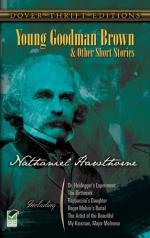|
This section contains 3,508 words (approx. 12 pages at 300 words per page) |

|
SOURCE: "The Forest of Goodman Brown's Night: A Reading of Hawthorne's 'Young Goodman Brown'," in The New England Quarterly, Vol. XLIII, No. 3, September, 1970, pp. 473-81.
In the essay below, Cook provides a psychoanalytic interpretation of Hawthorne's short story, observing that Goodman Brown's compulsive pact with evil is caused by his masochistic desire to punish himself.
"Thou wouldst not think how ill all's here about my heart . . . "
Hamlet v. 2, 220
I
In a literary epoch when the dominant field of action was the frontier settlement, the forest, and the fort, Hawthorne focussed on the world of moral imagination. His "Young Goodman Brown" is a paradigm of this particular world, and Brown's behavior on a fateful night in his life is the key to this haunting tale. Although the motives for Goodman Brown's behavior are ambiguous, the consequences of his compulsive acts are clear but frightening.
It is truly an enchanted...
|
This section contains 3,508 words (approx. 12 pages at 300 words per page) |

|


